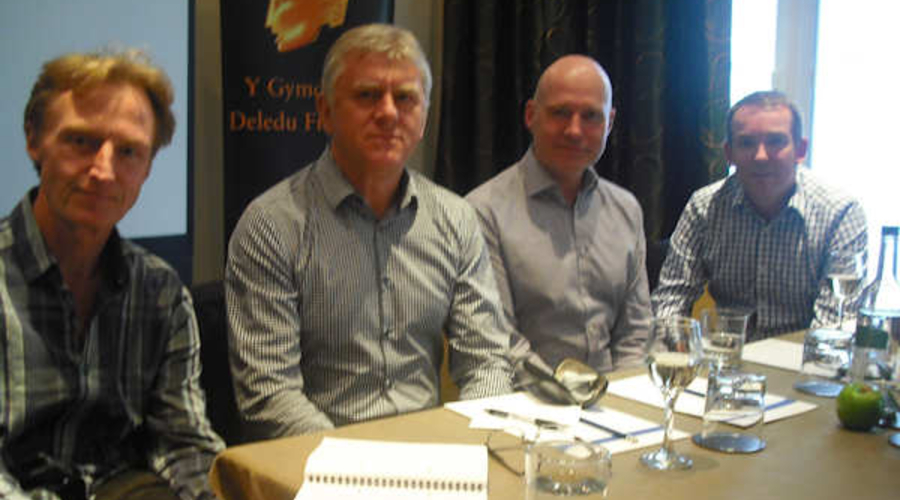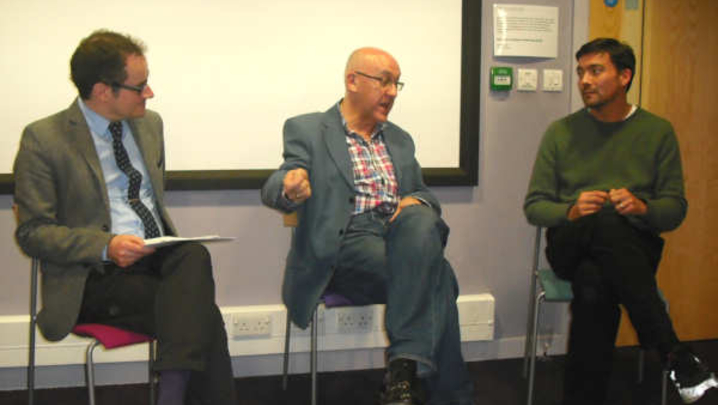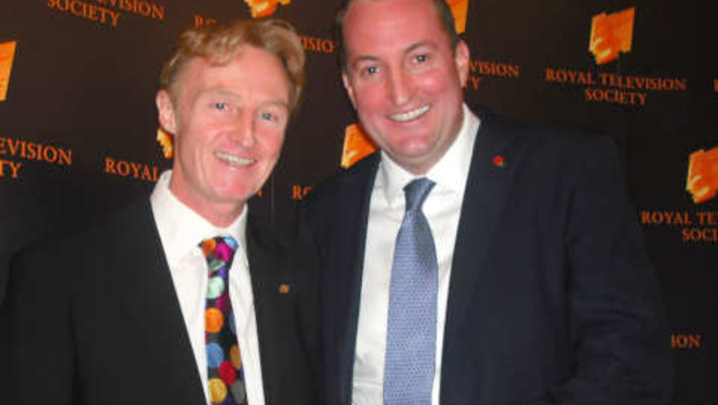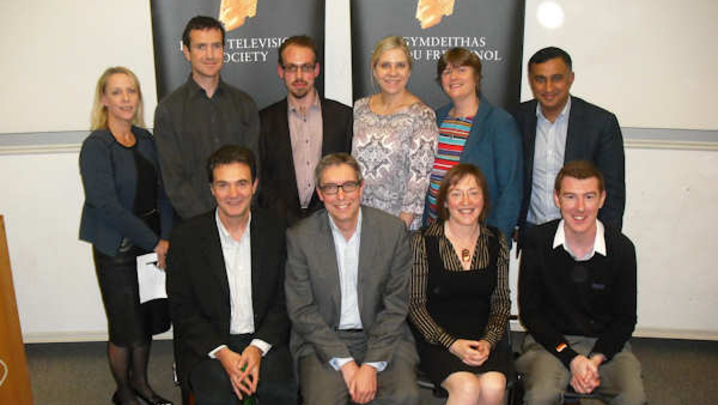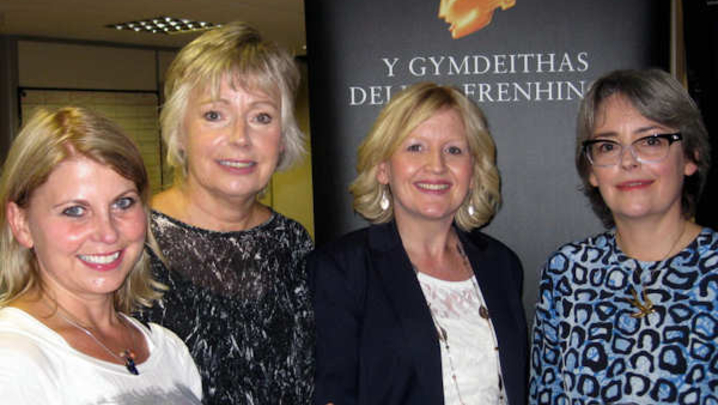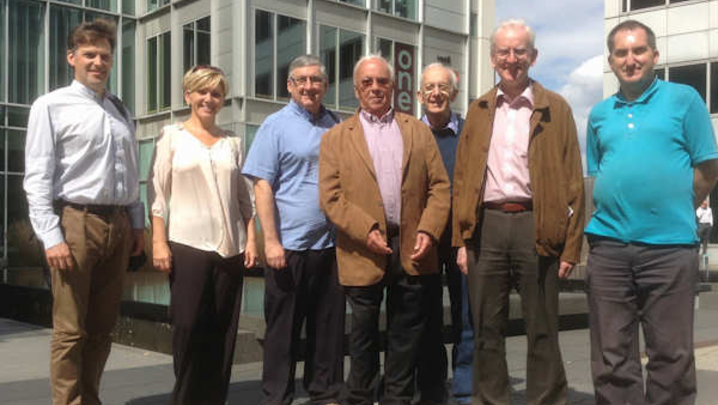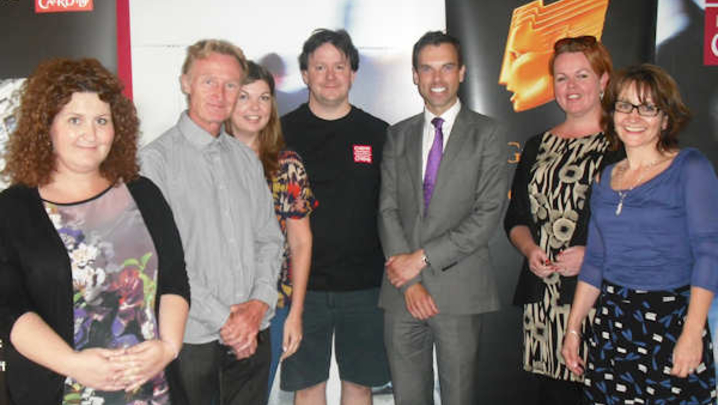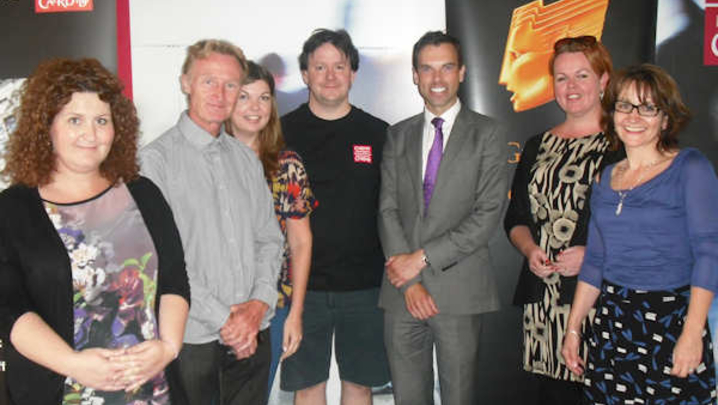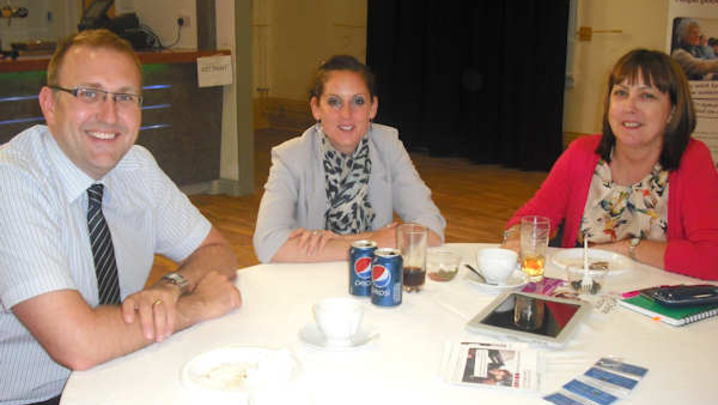Above: Tim Hartley with Ian Jones (S4C), Phil Henfrey (ITV), and Rhodri Talfan Davies (BBC)
Picture from our 'Meet the CEOs' event at the Park Plaza in Cardiff on 16th May.
The day before, the following article was published in the Western Mail, under the title:
There's so much public subsidy for TV because of its vital cultural role
It was good to hear BBC Wales director Rhodri Talfan open a discussion about the nature of television in Wales at this year’s Celtic Media Festival. He asked whether we need to see and hear more Welsh on English programmes and even, perhaps, some more English on Welsh programmes.
Good to hear because, for too long, the debate over Welsh television has been bogged down in issues of corporate governance and cuts to funding. We seem to have forgotten the purpose of television programming – to entertain and inform, yes, but also to hold a mirror up to us as a society and ask us what we might want to be.
Despite the doom and gloom of the past few years and the shadow of cuts and reorganisation, Welsh television is still in pretty good shape. The BBC’s Story of Wales was a landmark history series which also succeeded in being very popular. The Beeb is still the leader for news and sports coverage and it continues to invest in big drama productions such as Sherlock, Doctor Who and Casualty, all made at Cardiff's purpose-built Roath Lock studios. But there is concern that it seems to have given up on making indigenous drama or comedy about Wales, for Wales.
ITV, too, is in good health. Its financial results are positive and nationally it is looking to increase in-house production and diversify revenue streams. Its regional licences are likely to be extended until 2024, which should guarantee Welsh audiences four hours of news and 90 minutes of non-news programming every week under a new Welsh-specific licence. That’s good news for viewers because ITV News Cymru Wales, its online service and programmes such as Wales This Week, Fishlock’s Wales and The Ferret offer an alternative take on life in Wales.
S4C, now almost fully funded from the licence fee, at last seems to have entered a period of stability. It too has had some notable successes, the children’s service ‘Cyw’, award-winning drama and the continued appeal of Pobol y Cwm. S4C’s Digital Fund for multi-media ventures shows it can evolve to meet the challenges of changing technologies and consumer demands. Impact and audience reach are important in a converging technological world, but Welsh-language television will, rightly or wrongly, still be judged by audience figures. And that is the station’s Achilles heel.
Local television is set to hit our screens, in Cardiff at least, later this year. Made In will offer two hours of original programmes every weekday in and around the capital and the UK government hopes to set up similar ventures with stations in Mold, Bangor and in Swansea. Whether the dream of a vibrant local TV network is economically sustainable is a big question. But add to this the micro news and information websites and the explosion of user-made content online, and we surely must have more audio-visual content from Wales available than ever before.
In the independent production sector there have been notable successes, the expansion and diversification of Tinopolis and Boom Pictures being the most obvious examples. But, despite making some great programmes, most companies in Wales seem happy to move from one commission to another and fight over the ever-decreasing cake of public service funding. Maybe it’s a good thing – programmes first, business second.
Some commentators and politicians have argued that we could make even more progress if only we had control over broadcasting here in Wales. But what does devolving broadcasting actually mean? Awarding local radio licences and elements of content regulation through a Welsh Ofcom sound attractive and both are attainable. But I can’t see the balkanisation of the BBC and the carving up of its budget between the nations of the UK happening anytime soon, because that is where the real money and power lie. Ofcom has consulted on a specific independent television licence for Wales. Any new company could protect Welsh interests if there were a takeover of ITV. But it would surely be an ITV affiliate, still show Corrie and Emmerdale and be subject to the same financial pressures as exist at the moment. So no real change there.
The Welsh Government is keeping an open mind on devolving control of the media to Wales. But the UK Government told the Silk Commission on Devolution in no uncertain terms: S… there is no evidence to suggest that devolution of broadcasting policy or a different approach to funding the BBC would benefit licence fee payers… There is a greater net benefit to the nation and all its constituent parts in having broadcasting reserved.T
Control over public appointments and some formal accountability in Wales could be a good thing , but that doesn't seem likely, so now can we please park this issue and get on with the real business of deciding what kind of television service we want in Wales?
We know that the creative industries are important to Wales and to Britain. They provide good, often highly-paid, employment and are a source of export revenue as major series like Downton Abbey and Doctor Who sell across the world. But television is first and foremost a force for cultural, not economic, good and we must stop looking at television production simply as a means of creating wealth or "moving up the value chain" or any of the other mantras so beloved of governments in London and Cardiff Bay. The reason there is so much public subsidy for television is because it fulfils that vital cultural role.
The commentator Jon Gower quotes an American academic who said that a nation that does not see itself on television starts to believe it does not exist. As Wales enters a new political, cultural and multi-media era, it is the purely cultural questions which we should be asking. Who are we and where do we think we are going? How do we write the next chapter in the story of Wales? And I would add, this one: please can we have fun while we are doing all this?
Wales has a vibrant and successful television industry, one of which we are rightly proud and which in many ways defines us as a nation. Last night’s RTS discussion offered something of a health check for Welsh television and asked the bosses some difficult questions about what we really want to see on our screens in Wales. After all, they are the questions the audience would be asking.
Tim Hartley, Chair of the Royal Television Society, Wales.
(published in the Western Mail, 17th May)
Tim's article sparked a lively debate when it was published on the Institute of Welsh Affairs Web site, including an article written by Angela Graham in response to it.

